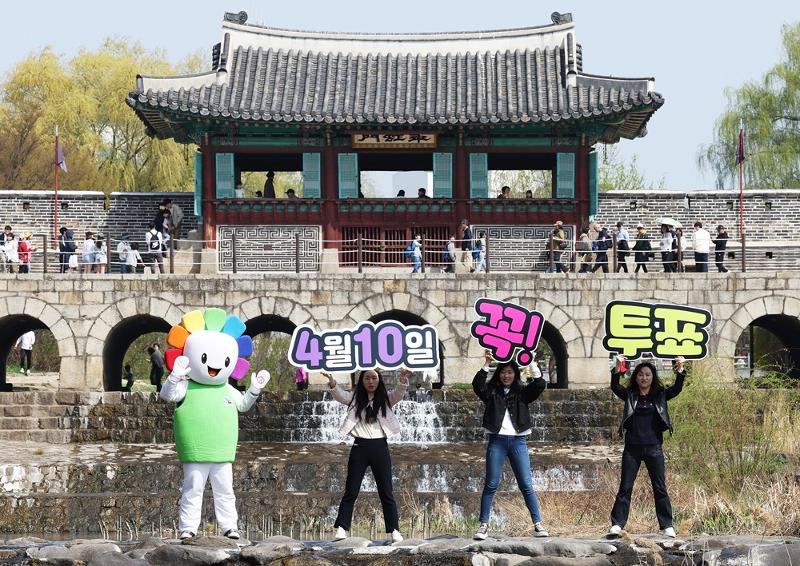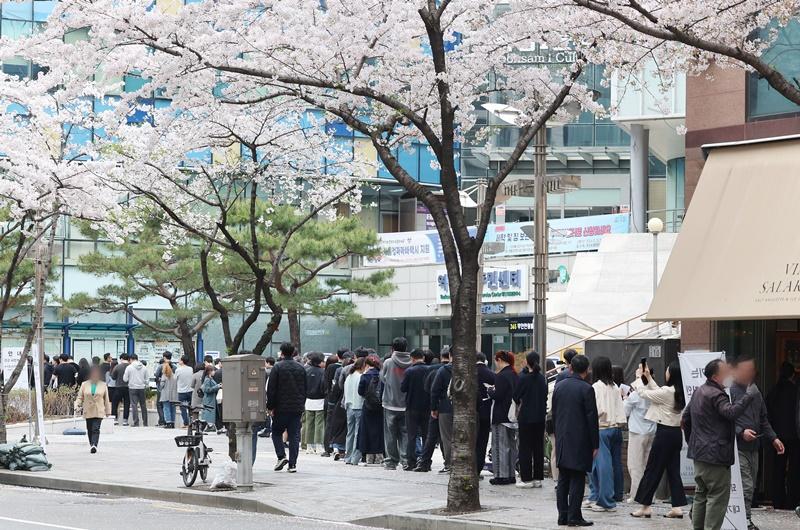
Staff from the National Election Commission's branch in Gyeonggi-do Province on April 7 hold a campaign to encourage voter turnout in the April 10 general elections.
By Israa Mohamed
Photos = Yonhap News
The 22nd general elections, the country's flower of democracy, on April 10 is an occasion for celebration to allow the public to elect lawmakers for a four-year term.
Since the official campaign period kicked off, a festive atmosphere has taken hold across the nation. This unique election culture is quite an experience for expats who have not gone through it before.
"I was impressed to see candidates bowing to commuters 90 degrees at subway stations from early morning to late evening."
"In Russia, electioneering is usually a rigid and serious affair but it was refreshing to see in Korea campaign staff dance and sing to support their candidates."
"Indonesia has just one day for general elections, but the early voting system in Korea left its mark on me."
"I found it initially strange to see candidates and their supporters sing and dance on campaign vehicles going around the city but it got more enjoyable over time."
"I find it very convenient that each party has its own its unique color and number to allow recognition from far away."
These comments from foreign staff writers of Korea.net express their impressions of the nation's election culture.
The National Election Commission (NEC) said 699 candidates from 21 parties registered to vie for 254 legislative seats in the general elections, with a competition ratio of 2.8:1.
In addition, 253 candidates from 38 parties will compete for 46 proportional seats. With more parties seeking such seats, voters in this week's elections will use the longest ballot in the nation's history of 51.7 cm.
In Korea, candidates can officially campaign on the streets. The NEC said the official 14-day campaign period is from March 28 to April 9, the day before the elections, from 7 a.m. to 11 p.m. daily.
Candidates can use microphones or campaign buses to promote their pledges and messages and use methods like playing trot tunes with revised lyrics or theme songs and dance to gain voter support.
Voters can also use props of legally permissible sizes to promote their candidates to other voters. Every year, the NEC announces the proper campaign methods for voters on its official website (www.nec.go.kr) to encourage compliance with election laws and regulations.

Voters on April 5 queue up to vote in the 22nd general elections at an early voting station in the Yeoksam 1-dong neighborhood of Seoul's Gangnam-gu District. (Yonhap News)
Another unique feature of domestic election culture is the early voting system to protect suffrage and raise voter turnout. From April 5-6, early voting stations allowed people to cast their ballots without needing to designate where they vote or register to do so. This approach is something other countries could consider adopting.
The mission of NEC branches nationwide like those in Jeju Island and Gyeonggi-do Province to encourage voter turnout is another distinct facet of the upcoming elections. To stimulate higher participation, educational institutions also run events to encourage voting like offering gift vouchers to students who take selfies at polling stations after voting.
ess8@korea.kr